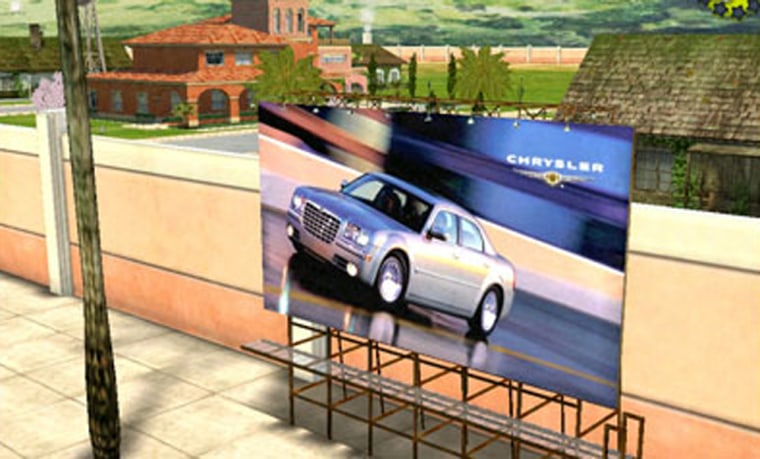In Test Drive Unlimited, a much-anticipated multiplayer videogame from Atari, players can take a break from the races to go shopping. The Internet-based title will feature at least ten real-world brands (including Lexus and Hawaiian Airlines) when it comes out in September. Players will be able to zip around on Ducati Supersport motorcycles and visit a virtual Lamborghini dealership. Ben Sherman, a men's apparel retailer in London, will allow gamers to buy clothes in a 3-D replica of one of its real-world stores. It paid less than $500,000 for its in-game outlet. "This is a new route to our market," says Suzanne Egleton, head of marketing at Ben Sherman.
A stampede of marketers, including Apple, Procter & Gamble and Visa, are paying for product placement in games. Graffiti artists in Atari's Getting Up: Contents Under Pressure listen to tunes on Apple iPods while tagging walls with Montana Gold spray paint. In Tom Clancy's Splinter Cell Pandora Tomorrow from publisher Ubisoft Entertainment, players use Sony Ericsson phones to get clues to bust terrorists. Players watch video demos of skateboarding moves on Nokia's N93 phone in the next Tony Hawk game coming from Activision.
Today there are 132 million teen and adult gamers in the U.S., where nearly half of all households have a game console; marketers are desperate to engage this well-to-do audience. Spending on in-game advertising and product placement, $56 million last year, will reach $730 million by 2010, predicts Yankee Group, a Boston research firm.
Not long ago videogames were for techno-addicted young geeks. Ads inside games, mostly from soft-drink purveyors, were plastered on grainy 2-D billboards that appeared fleetingly alongside racetracks or ball fields. Now companies can put their brands almost anywhere —characters can drink from a Coca-Cola can or drive a Chrysler.
Game publishers need the ad revenue. Activision, Electronic Arts and other companies spend as much as $20 million to develop a blockbuster. They can recover some of the cost from product placers, who do not blanch at the fee. Advertising in videogames, after all, gives marketers a rare opportunity to buy a starring role in a popular entertainment vehicle. (A videogame ad costs $30 per 1,000 people reached, says Michael Dowling, chief of Interpret, a digital-media research firm.)
Castrol Syntec, which paid to have branded quick-lube shops in EA's Need for Speed, offers cheat codes and performance packs for players. In CSI: 3 Dimensions of Murder, Ubisoft's crime-solving game, Visa's fraud-protection service alerts players to a stolen credit card that helps gamers crack a murder case. "We've never before been able to have the consumer really engage with the message," says G. Jon Raj, who heads advertising and emerging-media platforms at Visa and says he wouldn't have purchased "just a billboard in a virtual world."
Improvements in technology have made games more ad-friendly. Ads in Web-based games can be changed quickly because they aren't hard-coded into limited areas during game development. And marketers can use videogames to target and track potential customers. Toyota Motor Corp. recently created Club Scion, an online hangout in Whyville, an interactive community of 1.7 million kids ages 15 and under. Toyota execs get updates about how many kids visit its club and how often they chirp about the brand in chat sessions. Toyota also gets feedback about the car accessories Whyville-ites buy through the Web site.
Double Fusion of San Francisco, an ad-placement broker, has homegrown software that helps marketers pick the best titles for their brands. It divides games into 16 categories based on player demographics so that companies can put brands in games that appeal to certain types of consumers — say, women in their 30s. Double Fusion's Internet servers push ads into the game in real time as the gamer plays so that the company knows the size of each branded element she sees, such as a delivery truck or a storefront, and the amount of time it is flashed on the screen. Advertisers are then charged based on gamer views.
This is a growing industry. Microsoft Corp. earlier this year reportedly paid between $200 million and $400 million for Massive, another company that places ads in games. There will be more games, too. A few marketers are creating their own titles. America's Army, a violent shoot-'em-up distributed for free by the U.S. Army, has attracted 7 million registered players. In Danica's Secret 500 Challenge, a game sponsored by P&G, racing fans can create characters that compete on the track. The title combines references to Danica Patrick, the female Indy 500 star, and to P&G's antiperspirant.
Not all games are suited for ads. "There is a lot of swordplay in Dungeons & Dragons games, but you won't see us putting a Remington sword in there," sniffs Wim Stocks, an executive vice president at Atari. "D&D fans would react violently."
EA, which sells space in games to marketers, including General Motors and Nike, had a similar response when a financial institution recently offered $1 million to sponsor virtual mortgages and small-business loans in the Sims 2. "The bank wanted every financial transaction to be run through its interface, but we weren't comfortable with that," says Julie Shumaker, EA's director of advertising. "Our currency is the Simolean, and our language is Simlish. We wanted to maintain the fantasy." But it's getting harder to turn down those real-life simoleons.
